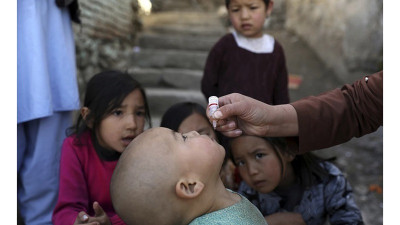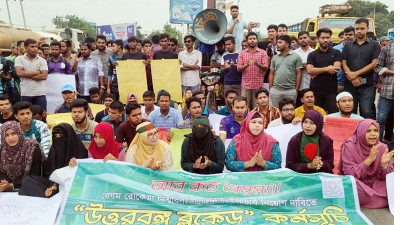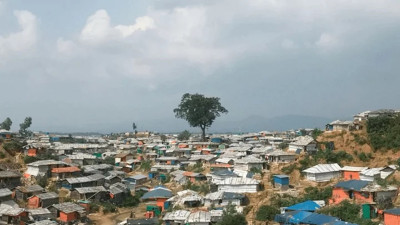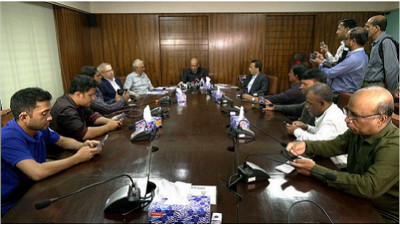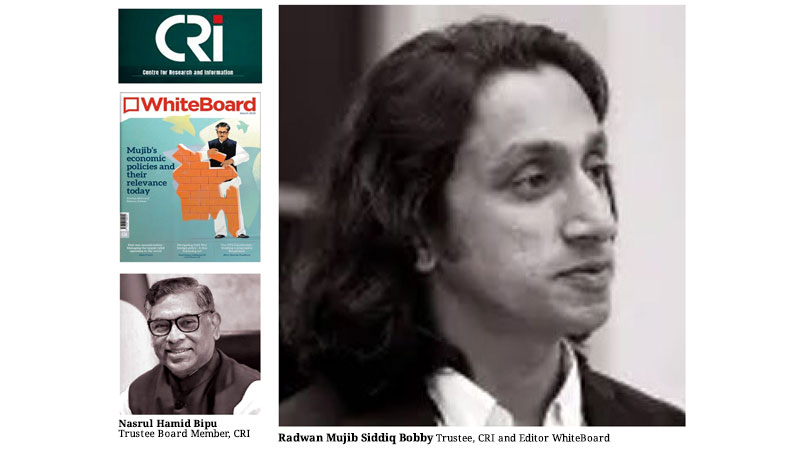 Radwan Mujib Siddiq Bobby, Trustee, CRI and Editor, WhiteBoard
Radwan Mujib Siddiq Bobby, Trustee, CRI and Editor, WhiteBoard In one of her interview, the ousted Prime Minister Sheikh
Hasina said, "Sheikh Mujib was a social democrat who envisioned Bangladesh
as a welfare state. He wanted to improve people's basic needs like food and
housing through socialism. He believed in the 'leave no one behind' approach.
He also clarified that Bangladesh would not import any ideology from elsewhere.
In other words, everything would be managed according to our ideology. To understand
these nuances, you need to delve into our history."
Sheikh Hasina's interview was published by her party's
research cell, the Center for Research and Information (CRI), in their magazine
'WhiteBoard.' It covers her experiences in governance over four terms, the
current and future state of the country, and various policy issues. During her
time in power, CRI was crucial in providing intellectual input to the Awami
League. This party thinks tank is predominantly staffed by members of the
Sheikh family, who were responsible for the publication of the policy-oriented
'WhiteBoard'.'
In 2010, the CRI became visible and active in
implementing various party agendas and shaping public opinion. The 'WhiteBoard'
magazine, a key player in this endeavor, serves as an intellectual policy
strategy and advisory body for the Awami League. To this end, the 'Young
Bangla' organization was established in 2014. Under CRI's supervision, the 'Joy
Bangla Youth Award' was launched for youth entrepreneurs and institutional levels.
Similarly, the 'Joy Bangla Concert' was organized around the March 7 speech of
Bangabandhu.
However, the organization also closely monitored various
activities of opposition parties and the party's members. At the same time,
there have been allegations against CRI regarding the dissemination of
propaganda, rumors, and fake news to suppress dissenting opinions before the AL
government fell from power. As a result, Meta has shut down 50 Facebook
accounts and 98 pages associated with the organization. The international
platform stated that the individuals involved were connected to the AL and CRI.
In a report for the first quarter of this year
(January-March), Meta also stated that Facebook pages associated with the AL
and CRI regularly posted content in Bengali and English. This included news,
current events, election-related posts, and criticisms of the BNP, allegations
of BNP corruption, the BNP's role in pre-election violence, and various posts
supporting the current government.
The chairman of CRI is Sheikh Hasina's son, Sajeeb Wazed
Joy. Her daughter, Saima Wazed Putul, serves as the vice-chairman. Other
members of the trustee board include Sheikh Hasina's sister, Sheikh Rehana's
daughter, Azmina Siddiq, and her son, Radwan Mujib Siddiq Bobby. Outside the
family, the trustee board includes former State Minister for Power, Energy, and
Mineral Resources, Nasrul Hamid Bipu. Tanmoy Ahmed is the research
organization's coordinator for the Sheikh family and the party.
While Sheikh Hasina was in power for 15 years and 7
months, the CRI magazine 'WhiteBoard' was launched on September 20, 2020.
Claimed to be the country's first policy magazine, this publication is intended
to provide an impartial and comprehensive review of policy issues, as conveyed
by Radwan Mujib Siddiq, the grandson of Bangabandhu and the chief editor,
during the inauguration ceremony.
At the inauguration ceremony, CRI trustee Radwan Mujib
Siddiq said, "This magazine will provide an objective and clear
message for policymakers and young people. WhiteBoard is creating a platform
for the most talented individuals in the country. It will also continue to
serve those working for Bangladesh from abroad."
The WhiteBoard website mentions that Radwan Mujib Siddiq
is a genealogical consultant and a young lawyer. He is also a patron of the
political history project, "Graphic Novel Mujib and Hasina: A Daughter's
Tale," a documentary film. Bobby, who holds a Master's degree from the
London School of Economics and Political Science, is a consultant in strategy
and communications for various international and governmental organizations.
The editorial board of WhiteBoard includes Syed Mofiz
Kamal as Co-Editor and Ruth Griffiths as Copy Editor. The magazine's website
lists 10 members on the advisory board. At the top of the list is Dr. Atiur
Rahman, former Governor of Bangladesh Bank. Dr. Atiur, who holds the
Bangabandhu Chair at Dhaka University, is also the Executive Director of the
research organization Development Coordination. With a doctoral degree from
SOAS, University of London, this economist's expertise in sustainable finance,
financial inclusion, and monetary policy is highlighted in WhiteBoard.
The WhiteBoard notes that another board member, Syed
Akhtar Mahmood, is an economist who worked at the World Bank for three decades
on private sector development. In 2002, Akhtar Mahmood co-authored the World
Bank's private sector development strategy and has led global efforts in
regulatory reform and public-private dialogue. His research areas include
trade, competition, investment climate, policy reform mechanics, and political
economy. Akhtar Mahmood, a doctoral degree in economics from Oxford University,
was also a visiting fellow at Yale University.
During Sheikh Hasina's tenure, Mohammad Shahidul Haque,
who became Foreign Secretary in 2013, played a significant role in implementing
the country's foreign policy. He is also a member of the advisory board of
WhiteBoard. The publication's website first highlights his position as the
Bangabandhu Chair at Delhi University. This diplomat, an expert in foreign
policy and migration, is a senior fellow at North South University. A former
director of the International Organization for Migration (IOM), he co-authored
the book "Springer 2020" on migration. Shahidul Haque holds a
Master's degree from the Fletcher School of Law and Diplomacy at Tufts
University in the United States.
The advisory board of WhiteBoard includes several
individuals associated with BRAC, a world-renowned development organization
based in Bangladesh. One such member is Samia Haque, the Dean of the School of
General Education at BRAC University, a member of the Academic Council, and a
professor of anthropology. As a research fellow at the Center for Peace, she
has led collaborative projects with the World Faith Development Dialogue at
Georgetown University. Her research areas include secularism, extremism,
religious revival, social movements, gender issues, and democracy. She
completed her postdoctoral studies in anthropology at Brandeis University.
Another member of the advisory board is Shajia Omar.
Shajia, who has worked as a communications consultant for BRAC, is a
communications and stakeholder engagement specialist at the World Bank. She has
also been a communications consultant for international organizations such as
UNDP, IOM, ILO, and IFC. She completed her Master's degree at the London School
of Economics and Political Science.
Asif Saleh, the Executive Director of BRAC, is a member
of the advisory board of WhiteBoard. The publication describes him as a writer,
technologist, and social entrepreneur. He was a policy specialist for the Prime
Minister's Office's Access to Information (A2I) program. Asif, who has also
served as an Executive Director at Goldman Sachs, has worked for IBM, Glaxo
Wellcome, and Nortel. He holds a degree from the Stern School of Business at
New York University.
Sonia Bashir Kabir, a renowned technology entrepreneur
and impact investor, is the Chairman and CEO of SBK Tech Ventures and SBK
Foundation. She is also a member of the Board of Trustees at BRAC University
and serves on the board of UNESCO's Mahatma Gandhi Institute of Education for
Peace and Sustainable Development. Sonia has previously served as the Managing
Director for Microsoft in Bangladesh, Myanmar, Nepal, Bhutan, and Laos. She
completed her Master's degree at Santa Clara University.
Scientist Senjuti Saha is a member of the advisory board
of WhiteBoard. She is the Director of the Child Health Research Foundation
(CHRF) and serves on the Polio Transition Independent Monitoring Board of the
World Health Organization (WHO). Her research focuses on preventable infectious
diseases in children. Senjuti completed her postdoctoral work in molecular
genetics at the University of Toronto and led the decoding of the AARS-COV2
genome in Bangladesh.
Kazi Anis Ahmed, the Director and CEO of Gemcon Group and
a director at Kazi & Kazi Tea Estate Limited, is a member of the advisory
board of WhiteBoard. He is also the co-director of the literature-centric Dhaka
Lit Fest and the president of the Bangladesh branch of PEN International, an
influential international organization for writers, bloggers, and journalists.
He has completed a postdoctoral degree in literature from New York University.
The final member of the advisory board is Azmina Siddiq,
Sheikh Rehana's younger daughter. She is an Advocacy and Policy Advisor at the
Tony Blair Institute for Global Change. According to her profile on the
WhiteBoard website, Azmina Siddiq is a sociologist and a security policy
expert. Her research areas include political risk and counter-extremism. She
completed her Master's in security studies from King's College London.
On the occasion of the launch of WhiteBoard, an Editors'
Note was published, and Radwan Mujib wrote, "Why are we initiating this
now? Because Bangladesh is making rapid progress, relying on its youth. Yet,
there are new challenges ahead. Bangladesh aims to be among the top 30
strongest economies in the world by 2030. However, there is no data-driven analysis
of what is happening in our country. This is why WhiteBoard is starting its
journey. WhiteBoard will present a comprehensive overview of activities for
students and young professionals both in the country and abroad, as well as for
policymakers and implementers."
Radwan Mujib further wrote, "WhiteBoard will provide
data-driven analysis and reviews on everything from economics to gender-based
violence, and from technological innovation to youth employment. The first
issue of this magazine discusses the policies and plans adopted by Bangladesh's
founder, Bangabandhu Sheikh Mujibur Rahman, to rebuild the war-torn country.
Consequently, it addresses and dispels misconceptions about his administration
that emerged after the assassination of Bangabandhu and his family members in
1975, revealing the truth. Although Bangabandhu's remarkable achievements might
seem overshadowed by his administrative activities, it is essential for current
policymakers and young people to understand them."
The main office of the Awami League's research cell, CRI,
is located at Building 2, 32 Dhanmondi, Dhaka. CRI's activities were also
conducted from Sheikh Hasina's political office in Dhanmondi and another office
at 6/A Dhanmondi. However, following the fall of Sheikh Hasina's government on
August 5, the offices adjacent to Bangabandhu Bhaban and Sheikh Hasina's
political office were set on fire and destroyed.
During a visit to CRI's three offices yesterday, it was
observed that the office adjacent to Bangabandhu Bhaban, which was destroyed by
fire, remains closed. The same situation applies to the office adjacent to the
Awami League President Sheikh Hasina's political office.
Several employees at CRI, who wished to remain anonymous,
indicated that the logistical support of the organization was destroyed in the
fire, making it unlikely that operations will resume anytime soon. They also
have no idea when the activities might be able to start again.

